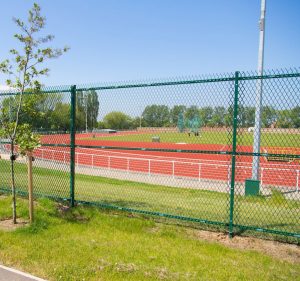Top tips for specifying sports ground fencing
9th May 2017

With so many different types of fencing available today, it is essential that the right one is specified in order to achieve the correct performance within the available budget
Sports grounds need fencing, either to stop balls straying or prevent trespassing – or both. However, with so many different types to choose from, specifying fencing is not straightforward. This article provides five top tips to help specifiers select the optimum fencing and stay within budget.
Stray balls interrupt the flow of play and can annoy neighbours, and if there is a road adjacent to the sports field, they have the potential to cause accidents. Consequently, sports such as football – particularly five-a-side football – hockey, basketball, netball and tennis often require perimeter fencing to prevent balls from leaving the playing area. At the same time, sports facilities are expensive to construct and maintain, and there are issues relating to insurance, so it is important that trespassers are kept out when the sports ground is not in use.
1 – What are your goals?
This will depend on the layout of the ground and the playing and training areas within it, the sport(s) being played, as well as the likelihood of trespassing and whether these people will be dog walkers, unauthorised users or vandals. Considering such factors will help to determine the required strength and security of the fencing. But bear in mind that sports grounds need to remain welcoming, so aesthetics should not be forgotten. If the requirement is only for boundary demarcation, then lower-cost fencing or railings may be sufficient.
2 – Don’t buy maintenance headache
For many years chain link was the default option for fencing playing fields, tennis courts and other sports facilities. However, chain link stretches and distorts, so it needs to be re-tensioned or repaired periodically. Today most sports facilities use mesh panel or welded wire mesh (weldmesh), usually galvanised to provide good corrosion protection and then finished with a tough polyester powder coat that provides a good appearance as well as adding, quite literally, an extra layer of protection. Weldmesh needs little or no maintenance and therefore is a far better option than chain link. Our recommended option for most sports grounds is Duo Mesh, a tough welded mesh fence with apertures of 200mm x 50mm. Twin horizontal wires at each intersection give a rigid but flat profile, with additional horizontal wires for the lower 1.2m resulting in a highly rigid fence with even and predictable rebound properties.
3 – How high?
The height of the fencing will depend on many factors, including local planning restrictions, but we can supply and install fencing up to 5m high. If this is not sufficient, we can fit ball stop netting that extends to a total height of 10m, or we can roof over the entire area with netting to ensure balls never stray.
4 – Choose a reputable installer
Fencing is only as good as the installation, and sports ground fencing must be installed correctly if it is to be safe, perform as intended and not fail prematurely. In the worst case, poorly installed fencing could cause injury to players who come into contact with fasteners that have been installed incorrectly, for example. Procter Fencing Systems (part of Procter Contracts) has its own teams of skilled and experienced installers, whereas many other fencing companies hire unskilled labour on a project-by-project basis. Specifiers should seek out installers who are accredited under schemes such as Building Confidence, Achilles Link-Up and UVDB. The workforce should have received CISS health and Safety training and be CSCS certified, supervisors should be at least SSSTS certified, and contracts managers should be SMSTS/IOSH qualified.
5 – Don’t forget the gates
If you are installing fencing, you will also need gates. Procter Fencing Systems can manufacture, supply and install gates to match the fencing or if powered gates are required (sliding, telescopic, swing or bi-folding), we can work closely with Procter Automatic Gates, which is also part of Procter Contracts. Whatever your need for a standard or bespoke gates, whether for pedestrians, vehicles or ground care machinery, we can supply and install it. In addition, we offer benches, team shelters (dugouts), litter bins, cycle racks and other items through Procter Street Furniture, the third part of Procter Contracts.
If you need sports ground fencing, gates or street furniture, contact us for a free, no-obligation site survey and consultation.
